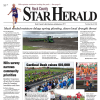Luverne City Council members approved a new ordinance at their June 13 meeting that regulates “pollinator” and “natural” lawns that are gaining popularity.
They include grasses and flowering plants that are allowed to bloom and seed out for pollinators, and they require less water and fertilizer than traditional lawns, which require chemicals that pollute groundwater and harm wildlife.
Done right, they’re good for the environment, but done poorly, they’re neighborhood eyesores that propagate noxious weeds.
According to Luverne building inspector Chad McClure, there are only a few Luverne property owners experimenting with natural lawns.
“Some are maintained nicely and neatly, and some we’re getting complaints about,” he said. “We just wanted to respect people’s ideologies and give them the opportunities to establish some alternative methods to turf grass.”
He said the ordinance specifies what qualifies as a pollinator lawn, and it provides parameters for property owners to grow them in.
“We wanted to make sure that it wouldn’t allow people to just let their grass grow long and call it a pollinator garden,” McClure said.
“We want them to do it in a manner that isn’t going to be egregious to neighboring property owners.”
To do it properly, he said a property owner needs to get rid of all turf grass, observe property setbacks, maintain it in a way so that at least once a year it gets cut down to a foot in height, and it can’t be taller than 60 inches.
The “natural lawn” area may not exceed 30 percent of the pervious surface area within setbacks.
“This lets people do what they want to do, as long as they do so in a way that’s specified and gives us an ability to regulate it,” McClure said.
“Nothing makes everybody happy, but at least this will be much more orderly for the ones we have received complaints about. … The ones who do maintain them with diligence and with pride we never have complaints about. It’s just the ones who get unruly and are haphazardly out of control. This ordinance would take care of those.”
McClure and city clerk Jessica Mead were involved in helping the council write the ordinance, which is based partly on similar ordinances in effect in other cities.
The ordinance allows “managed landscapes in residential areas and provides opportunities to meet other goals of biodiversity and conservation.”
It “promotes native plants and managed landscape practices and expands and improves the quality of habitat corridors between larger protected areas and residential, urban areas.”
The ordinance also provides context as to what defines native vegetation and turf grasses.
New Ordinance qualifies 'pollinator', 'natural' lawns in Luverne
By
Lori Sorenson


